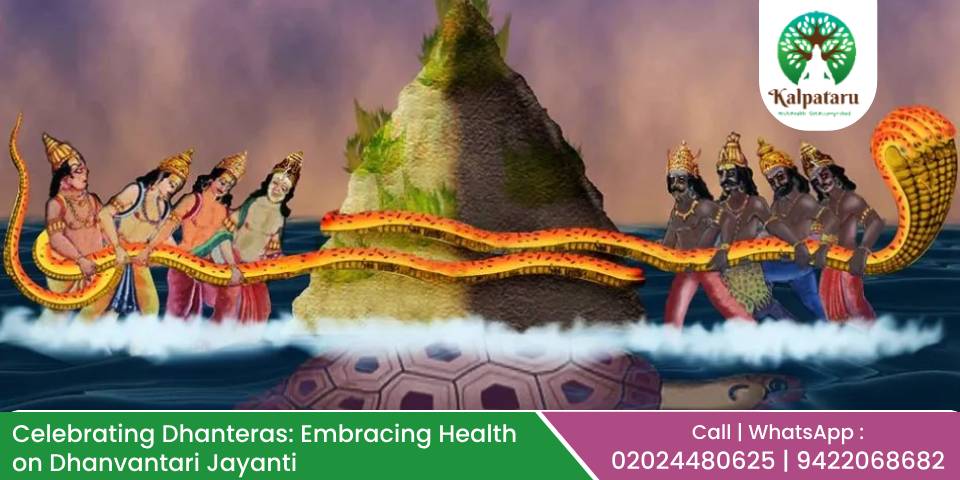Diwali, the festival of lights, brings with it a unique day of celebration in India known as Dhanteras. On this auspicious occasion, the medical community in the country rejoices in the spirit of Dhanvantari Jayanti, venerating the God of Ayurveda and the physician of the gods, bhagvan Dhanvantari.
The Mythical Tale of Dhanvantari's Birth:
The narrative begins with the irate Durvasa Rishi cursing Indra, causing chaos in Devaloka. To restore balance, the gods decided to churn the ocean, using Mandara Mountain and the serpent Vasuki. From this cosmic endeavor emerged various treasures, both benevolent and malevolent. Notable among them were the Halahal poison, Varuni, the Kaustubha gem, the Parijata tree, Kalpavriksha, Kamadhenu, and, of course, Lakshmi. Amidst these treasures, Dhanvantari emerged from the ocean, carrying a pot of amrita, the nectar of immortality.
Symbolism in Dhanvantari's Four Hands:
Dhanvantari is depicted with four hands, each holding a symbolic item shedding light on the path to holistic health.
- The Conch (Shankha): Representing the sky element, it symbolizes sound. According to Panchabhuta Chikitsa, a health system founded by Late A. W. Datar Shastriji, a balanced sky element contributes to overall well-being. Dhanvantari suggests that aligning the sky element within our bodies promotes good health.
- The Discus (Chakra): With 108 spokes, this chakra mirrors the time cycle in the Rig Veda. Ayurveda emphasizes the significance of proper timing in maintaining good health. Dhanvantari advises that adhering to the right practices at the right time contributes to overall well-being.
- The Jalauka (Leeche): It’s a water creature, it is a vital tool for bloodletting ( Raktmokshan panchkarma treatment) in Ayurveda. Dhanvantari underscores the importance of pure blood for overall health, as Ayurveda’s treatments are rooted in the health of the blood element.
- The Pot of Amrita: Establishing the sky element and maintaining a healthy blood element lead to the elixir of health, represented by the pot of amrita. Dhanvantari guides that achieving balance in these elements results in overall well-being.
The Legacy of Dhanvantari in Ayurveda:
Another Dhanvantari, the son of King Dhanv from Kashi, played a pivotal role in shaping Ayurveda. Bestowed with knowledge from Rishi Bharadwaj, he created eight branches of Ayurveda, known as Ashtanga Ayurveda. Sushrutacharya, his disciple and hailed as the Father of Surgery, shared surgical principles that still command respect in modern surgical medical literature.
For more information and treatment modalities watch our informative video
Celebrating National Ayurveda Day:
As we celebrate Dhanteras and Dhanvantari Jayanti, let us embrace the teachings of Dhanvantari, worshiping with devotion and singing praises to the health-bestowing deity. In doing so, we invite the blessings of Dhanvantari for a life filled with well-being and good health.
This special day holds not only cultural significance but is also recognized as National Ayurveda Day, reinforcing the importance of traditional medicine in promoting holistic health. May the wisdom of Ayurveda continue to guide us towards a healthier and harmonious existence.
Summary:
Dhanteras, the second day of Diwali, is observed in India as Dhanvantari Jayanti, dedicated to the God of Ayurveda. The celebration traces back to a mythological tale of cosmic churning, unveiling treasures and the emergence of Dhanvantari with the elixir of immortality. Depicted with four symbolic items, Dhanvantari imparts valuable lessons: the conch signifies the sky element, the discus emphasizes proper timing, the Jaluka underscores the importance of pure blood, and the pot of amrita represents holistic health.
Jay Dhanwantari
Jay Ayurveda!!!

